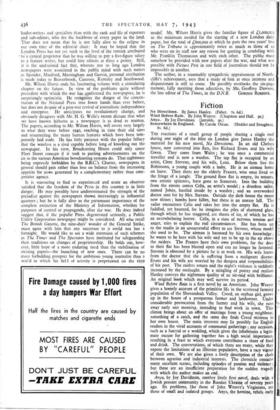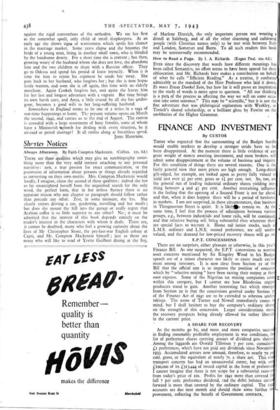Fiction
No Directions. By James Hanley. (Faber. 7s. 6d.) Wind Before Rain. By John Weaver. (Chapman and Hall. 9s.) Anya . By Joy Davidman. (Jarrolds. 9s.) Somewhere in England. By Carola Oman. (Hodder and Stoughton. 8s. 6d.)
THE reactions of a small group of people sharing a single roof during one night of the blitz on London give James Hanley the material for his new novel, No Directions. In an old Chelsea house, now converted into flats, live Richard Evans and his wife Gwen. They come from Wales ; he was once a commercial traveller and is now a warden. The top flat is occupied by an artist, Clem Stevens, and his wife, Lena. Below them live the Robinsons, a young couple with a baby. He is an airman home on leave. Then there are the elderly Frazers, who once lived on the fringe of a jungle. The ground floor flat is empty, its tenants, two artistic spinsters, have gone to Somerset. Into the building from the streets comes Celia, an artist's model ; a drunken sailor, named Johns, hustled inside by a warden ; and an overworked doctor sent for by Mrs. Stevens. Outside the dark house the moon now shines ; bombs have fallen, but there is an uneasy lull. The sailor encounters Celia and takes her into the empty flat. He is fuddled, yet haunted, for he imagines the piles of shattered glass, through which he has staggered, are sheets of ice, of which he has an overwhelming horror. Celia, in a state of nervous tension and anger, tries to explain the real circumstances. She has been up to the studio in an unsuccessful effort to see Stevens, whose model she used to be. The airman is harassed by his own knowledge ; he wants to be here with his wife and yet to be up in the air above the raiders. The Frazers have their own problems, for the door to their flat has been blasted open and can no longer be fastened. Stevens is obsessed by a picture he is at work on. His wife learns from the doctor that she is suffering from a malignant disease. Evans and his wife are worried by the dangers and responsibilities of his post. The raiders return and the night's violence is suddenly increased by the onslaught. By a mingling of poetry and realism Hanley conveys the nightmare quality of an air-raid with brilliance. An original book which may well survive its period. Wind Before Rain is a first novel by an American. John Weaver gives a homely account of the primitive life in the scattered farming population of the Shenandoah Valley. Creed, an orphan girl, grows up in the house of a prosperous farmer and landowner. Under considerable provocation from the farmer and his wife, she runs away early one morning, intending to find work in town. This climax brings about an offer of marriage from a young neighbour, something of a catch, and the same day finds Creed mistress in her own house. The main interests may lie possibly for English readers in the vivid accounts of communal gatherings ; any occasion, such as a funeral or a wedding, which gives the inhabitants a legiti- mate excuse for gathering together has a high social importance, resulting in a feast to which everyone contributes a share of food and drink. The conversations, of which there are many, while they expose the limitations of an illiterate population, have a racy vigour of their own. We are also given a lively description of the clash between agrarian and industrial interests. The chronicle contains many excellent scenes, including episodes of passion and violence ; but these are an insufficient preparation for the sudden tragedy with which the author makes an end.
Anya, by Joy Davidman, another lively first novel, deals with a Jewish peasant community in the Russian Ukraine of seventy years ago. Its problems, like those of John Weaver's Virginians, are those of small and isolated groups. Anya, the heroine, rebels early
against the rigid conventions of the orthodox. We see her first as the somewhat spoilt, only child of small shopkeepers. At an early age she shows signs of wantonness which spoils her chance in the marriage market. Some years elapse and she becomes the bride of a young man, living in another small town, who is blinded by the handsome dowry. For a short time she is content ; but then, growing weary of the-husband whom she does not love, she abandons him and the two children to elope with a Russian officer. They go to Odessa and spend his period of leave joyously. When it is time for him to rejoin his regiment he sends her away. She goes back to her husband, who forgives her ; but she is now hoper lessly wanton, and soon she is off again, this time with an elderly merchant. Again Cookeh forgives her, and again she leaves him for her last and longest adventure with a vagrant. But time brings its own harsh cure, and Anya, a little crazed by all she has under- gone, becomes a good wife to her long-suffering husband. Somewhere in England seems to be one of a series in a saga of war-time happenings at home. Thepresent volume opens on March the second, 1942, and carries us to the end of August. The canvas is crowded with a large assortment of busy femalesjsome of whom have a Miniverish +aplomb for dealing with every situation, be it air-raid or petrol shortage! It all rattles along at breathless speed. JOHN HAMPSON.



























 Previous page
Previous page